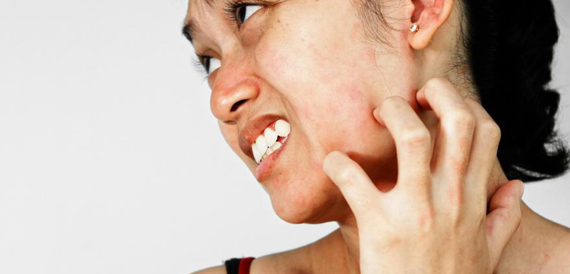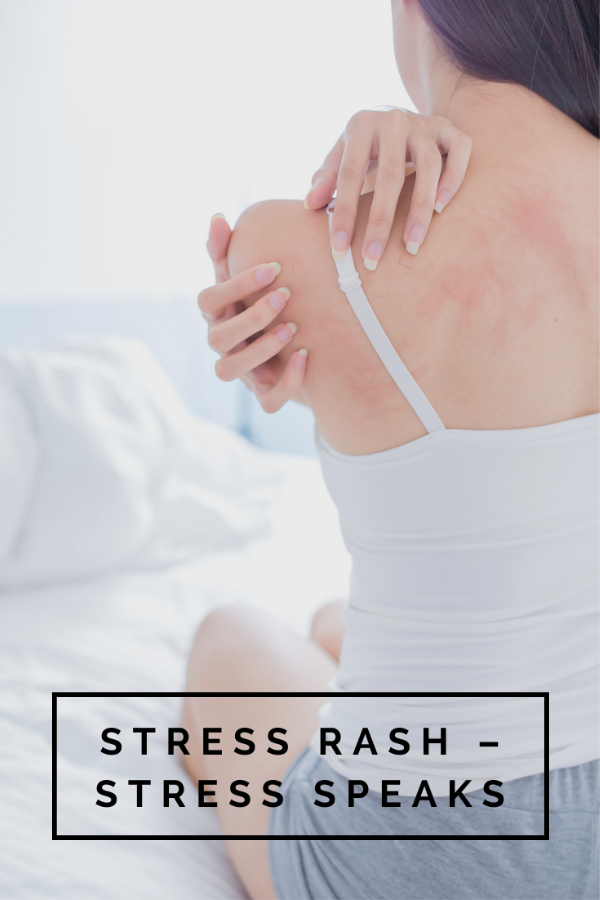
Credit:
My Story
Stress….Rash….What?
A Sign that You Are Overly Stressed
A Couple of weeks ago, I was reaching up to scratch my back, and was startled to find raised bumps that were highly tender to touch. I was puzzled….the last time I has anything like rash was scabies in 2002 (homeless children slept on the couch of my favorite restaurant, I am not surprised I am not scarred of the infection), and prior to that was 1 bout of chickenpox at the age of 7 or so. So, I know well about my itchy rashes and this was not any of them. Hell, it is not itchy or blistered as of yet, it is just there red and spread.
Of course, I googled and binged – extensively, and even sicced my husband and sister on it. We found nothing, seriously nothing. On the second day of the occurrence of rashes, it had spread further across my back, though still not triggering any noticeable oozing or itching or the like.
At a loss, I went to the pharmacy down the street. Quelle surprised, they did not have any clue either; therefore, I booked an appointment with a doctor. The rash did not seem to be contagious, as both my husband and kids were free of any rashing, I have not changed my routine medications, we have not changed our fabric softeners or detergents lately and as I mentioned earlier it was not painful or itchy, but I was still stumped.
Having said that, everyone I have talked to has asked me a ‘million dollar question’ – “Have you been overly stressed lately, is it stress (or anxiety) rash?” Well, yes – I had this mixed episode crap going on, and I have openly admitted that it was taking a toll on me. But what on earth is Stress rash? I was not at all familiar with this term. So, I decided to Google it to find out more information about it and decided to share my knowledge with all the readers of trustinfood.org.
| Stress affects Skin….PeriodWhen Stress goes physicalStress can affect whole body, including hair, skin and nailsStress can make it hard for skin infections to healYou must have noticed that when you are stressed, your skin break-out more. This is because stress causes your body to secrete cortisol, adrenaline or other hormones the blood stream, which further trigger your sebaceous glands to secrete more oil and we all know that oily skin is more prone to skin problems like acne and rashes. |
Unlike rashes that are caused by allergic reactions or sickness, stress rashes, also known as hives, urticaria or anxiety rashes are deemed to be caused from factors associated with stress such as histamine release, sweating, etc). The intensity of the rashes would primarily depend on the stressful circumstances.
Curing stress hives is chiefly dependant on an individual’s capability to control the stress levels. However, over-the-counter medicines and certain stress reducing activities may help control symptoms.
Read on to know the symptoms and treatments of rashes instigated by stress.
Symptoms of Stress Rash
- Stress or anxiety rash can appear on any area of the body, but it is commonly seen on the face, arms and back
- The rashes appear red and may be flat or raised. Some sufferers may experience itch and burning sensation
- The rashes may emerge and ebb away within hours like 8-12 hours while sometimes they may persist for longer period. In some instances, the condition may have lasting symptoms experienced over the period of 6-12 weeks. Stress hives can turn chronic in 1 out of 10 cases.
- The rashes can affect anyone irrespective of the age; however, people between the age group of 30 to 50 years (now you can guess my age) are more susceptible to the skin irregularity.
- Both the genders are susceptible to these rashes; however, it is widely reported in women.
Causes
A wide body of scientific literature confirms the connection between stress and skin rashes.
In 2005, a study was conducted at Taiwan University to identify the connection between stress and chronic skin rashes. The study concluded that stress is an eminent factor in the development of chronic skin rashes. Moreover, the researchers found that people suffering from chronic skin rashes were more prone than average to have undergone a stressful phase in the six months before the onset of symptoms.
Furthermore, a 2012 study at Hacettepe University in Turkey stated that 24.7% of instances of chronic rashes on skin were instigated by stress. A 2013 study in Brazil placed the stated figure at 16%. Additionally, a post-traumatic stress disorder has been linked to stress hives. A 2010 study at the University of Plymouth reported that people diagnosed with chronic rashes were almost twice as likely as average to be having PTSD.
However, no one is completely sure of the physical reasons why stress triggers a rash.
One theory states that stress hives develops when the body over-produces histamine as a response to a stressful event. The excess of histamine is believed to further produce the classic symptoms of itchy, red bumps on the skin.
Treatments of Stress Rashes
Conventional Treatments
Many stress hives do not need conventional medications to heal and disappear over time. For chronic stress hives, over-the-counter medicines called hydrocortisone cream may help. Hydrocortisone cream is effective and safe to use and it helps to soothe swelling and itching when applied directly on the affected skin. Applying a cold compress to the affected area for around 10 minutes can reduce inflammation and itching.
Alternative Treatments
Alternative treatments primarily focus on limiting the causes of stress rashes than rash itself. Numerous techniques and activities are catered towards alleviating stress and regulating histamine production in the blood. For instance, psychodermatologists recommend mild regimes like meditation, yoga and breathing exercises to reduce stress.
| Trivia – Researchers have found that meditation can reduce anxiety or stress by as much as 39%! |
Other techniques may include massage, acupuncture, hypnosis and counseling. Since stress obstructs the response of the immune system, reduction in the stress levels will help boost the ability of the body to fight skin complications like stress hives.
Word of Caution!
If you suffer from stress rashes, try to avoid scratching of welts on your skin, as this will only aggravate symptoms and may lead to bacterial/yeast infections if the skin is broken. Avoid sun exposure and high temperature water because they may cause the skin to perspire or swell and will irritate welts. Try to keep stress level at a minimum, as it has been known to worsen symptoms of rashes.
| Fun Fact – Women who gossip are more likely to live longer as gossiping releases progesterone, which helps relieve stress and makes you feel good. |
Enjoyed Stress Rash – Stress Speaks? Share it with your friends so they too can follow the Superfoodsliving journey.
Share on Pinterest
